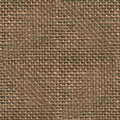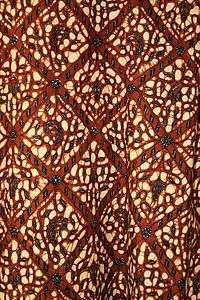Gabardine

Gabardine is a tough, tightly woven fabric used to make suits, overcoats, trousers, uniforms, windbreakers, and other garments.
Etymology
The word gabardine has been used to refer to a "dress, covering" at least since the 1590s.[1] It has been used to mean "closely woven cloth" since 1904.[2]
Fabric
The fibre used to make the fabric is traditionally worsted wool, but may also be cotton, texturized polyester, or a blend. Gabardine is woven as a warp-faced steep or regular twill, with a prominent diagonal rib on the face and smooth surface on the back. Gabardine always has many more warp than weft yarns.[3][4][5]
Cotton gabardine is often used by bespoke tailors to make pocket linings for business suits, where the pocket's contents would quickly wear holes in the usual flimsy pocket lining material.
Clothing made from gabardine is generally labeled as being suitable for dry cleaning only, as is typical for wool textiles.
Gabardine may also refer to the twill-weave used for gabardine fabric, or to a raincoat made of this fabric.
History

Gabardine was invented in 1879 by Thomas Burberry, founder of the Burberry fashion house in Basingstoke, and patented in 1888. The original fabric was waterproofed before weaving and was worsted wool or worsted wool and cotton, tightly woven and water-repellent but more comfortable than rubberized fabrics.[4] The fabric takes its name from the word "gaberdine", originally a long, loose cloak or gown worn in the Middle Ages, but later signifying a rain cloak or protective smock-frock.[5][6]
Burberry clothing of gabardine was worn by polar explorers, including Roald Amundsen, the first man to reach the South Pole, in 1911, and Ernest Shackleton, who led a 1914 expedition to cross Antarctica. A jacket made of this material was worn by George Mallory on his ill-fated attempt on Mount Everest in 1924.[7]
Gabardine was also used widely in the 1950s to produce colourful patterned casual jackets, trousers and suits. Companies like J. C. Penney, Sport Chief, Campus, Four Star, and California Trends were all producing short-waisted jackets, sometimes reversible, commonly known as weekender jackets.
Notes
- ↑ William Shakespeare The Merchant of Venice Act I sciii
- ↑ "Gabardine". Online Etymology Dictionary. Retrieved 2012-05-07.
- ↑ Kadolph (2007), pp. 240, 472
- 1 2 Cumming (2010), p. 248.
- 1 2 Picken (1957), p. 145
- ↑ Cumming (2010), p. 88.
- ↑ Replica clothes pass Everest test BBC News
References
- Cumming, Valerie, C. W. Cunnington and P. E. Cunnington. The Dictionary of Fashion History, Berg, 2010, ISBN 978-1-84788-533-3
- Kadolph, Sara J., ed.: Textiles, 10th edition, Pearson/Prentice-Hall, 2007, ISBN 0-13-118769-4
- Picken, Mary Brooks: The Fashion Dictionary, Funk & Wagnalls, 1957. (1973 edition ISBN 0-308-10052-2)



.svg.png)